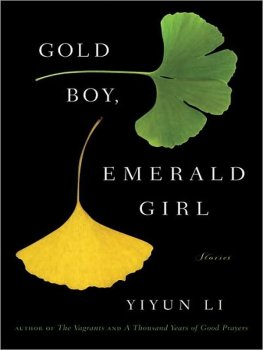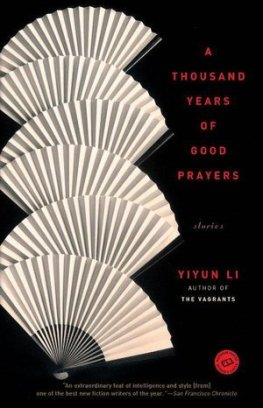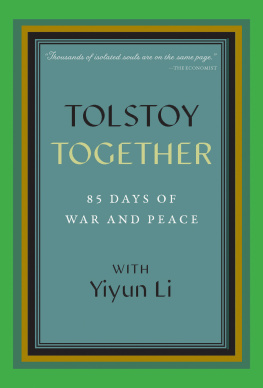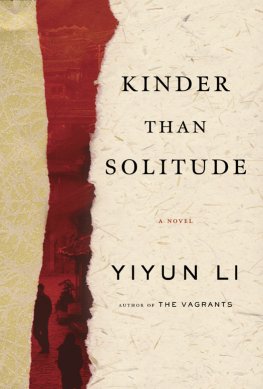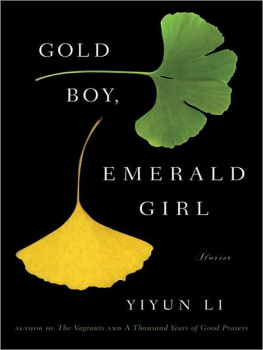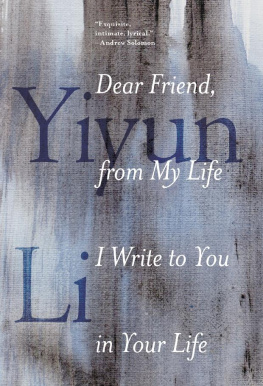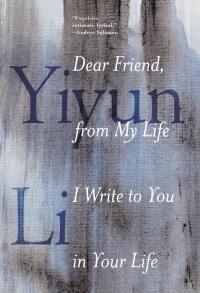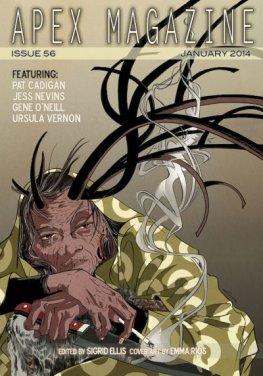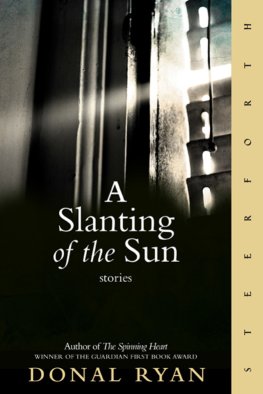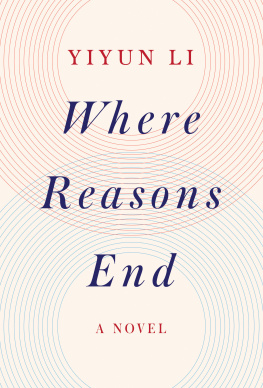Yiyun Li
Gold Boy, Emerald Girl
I AM A forty-one-year-old woman living by myself, in the same one-bedroom flat where I have always lived, in a derelict building on the outskirts of Beijing that is threatened to be demolished by government-backed real estate developers. Apart from a trip to a cheap seaside resort, taken with my parents the summer I turned five, I have not traveled much; I spent a year in an army camp in central China, but other than that I have never lived away from home. In college, after a few failed attempts to convince me of the importance of being a community member, my adviser stopped acknowledging my presence, and the bed assigned to me was taken over by the five other girls in the dorm and their trunks.
I have not married, and naturally have no children. I have few friends, though as I have never left the neighborhood, I have enough acquaintances, most of them a generation or two older. Being around them is comforting; never is there a day when I feel that I am alone in aging.
I teach mathematics in a third-tier middle school. I do not love my job or my students, but I have noticed that even the most meager attention I give to the students is returned by a few of them with respect and gratitude and sometimes inexplicable infatuation. I pity those children more than I appreciate them, as I can see where they are heading in their lives. It is a terrible thing, even for an indifferent person like me, to see the bleakness lurking in someone elses life.
I have no hobby that takes me outside my flat during my spare time. I do not own a television set, but I have a roomful of books at least half a century older than I am. I have never in my life hurt a soul, or, if I have done any harm unintentionally the pain I inflicted was the most trivial kind, forgotten the moment it was felt if indeed it could be felt in any way. But that cannot be a happy life, or much of a life at all, you might say. That may very well be true. Why are you unhappy? To this day, if I close my eyes I can feel Lieutenant Weis finger under my chin, lifting my face to a spring night. Tell me, how can we make you happy?
The questions, put to me twenty-three years ago, have remained unanswerable, though it no longer matters, as, you see, Lieutenant Wei died three weeks ago, at forty-six, mother of a teenage daughter, wife of a stationery merchant, veteran of Unit 20256, Peoples Liberation Army, from which she retired at forty-three, already afflicted with a malignant tumor. She was Major Wei in the funeral announcement. I do not know why the news of her death was mailed to me except perhaps that the funeral committee it was from such a committee that the letter had come, befitting her status thought I was one of her long-lost friends, my name scribbled in an old address book. I wonder if the announcement was sent to the other girls, though not many of them would still be at the same address. I remember the day Lieutenant Weis wedding invitation arrived, in a distant past, and thinking then that it would be the last time I would hear from her.
I did not go to the funeral, as I had not gone to her wedding, both of which took place two hours by train from Beijing. It is a hassle to travel for a wedding, but more so for a funeral. One has to face strangers tears and, worse, one has to repeat words of condolence to irrelevant people.
When I was five, a peddler came to our neighborhood one Sunday with a bamboo basket full of spring chicks. I was trailing behind my father for our weekly shopping of rationed food, and when the peddler put a chick in my palm, its small body soft and warm and shivering constantly, I cried before I could ask my father to buy it for me. We were not a rich family: My father worked as a janitor, and my mother, ill for as long as I could remember, did not work, and I learned early to count coins and small bills with my father before we set out to shop. It must have been a painful thing for those who knew our story to watch my fathers distress, as two women offered to buy two chicks for me. My father, on the way home, warned me gently that the chicks were too young to last more than a day or two. I built a nest for the chicks out of a shoe box and ripped newspaper, and fed them water-softened millet grains and a day later, when they looked ill, aspirin dissolved in water. Two days later they died, the one I named Dot and marked with ink on his forehead the first one to go, followed by Mushroom. I stole two eggs from the kitchen when my father went to help a neighbor fix a leaking sink my mother was not often around in those days and cracked them carefully and washed away the yolks and whites; but no matter how hard I tried I could not fit the chicks back into the shells, and I can see, to this day, the half shell on Dots head, covering the ink spot like a funny little hat.
I have learned, since then, that life is like that, each day ending up like a chick refusing to be returned to the eggshell.
I was eighteen when I entered the army. Lieutenant Wei was twenty-four, an age that I now consider young, though at the time she seemed much older, a lifetime away from me. The day I arrived at the camp, in a midsize city plagued by hepatitis and pickpockets, I came with a single half-filled suitcase. The army had sent an extensive list of supplies that would be issued to us: toothbrushes and towels and washbasins, mess kits, thermoses to be shared among a squad, uniforms for all seasons we used to joke that, had the army known the sizes of our bras, they would have ordered them too, dyed the same green as our socks and underpants.
A few men and women in uniform loitered under a tree. I had taken a night train, making a point of leaving home and arriving at the camp at the earliest time allowed. My father had seen me off at the train station, shaking my hand solemnly through the open window when the train whistled its signal of departure; my mother had not come, citing illness, as I had known she would.
After I registered, a woman officer, about a head taller than I was, her hair cropped short, introduced herself as Lieutenant Wei, my platoon leader. She had on a straw-colored uniform shirt buttoned to the top, dark green woolen pants, and a crimson tie. I did not cringe under her severe stare; I had lived, until then, beneath the unrelenting eyes of my mother. Decent if not strikingly beautiful sometimes during a meal she would study my face and comment on it; in the evenings when my father was working the night shift, she would remark on my adequately developed curves. I had learned that if one remained unresponsive in those situations one could become transparent; when my mothers eyes peeled off my clothes piece by piece they would meet nothing underneath but air.
After I changed into my uniform, Lieutenant Wei ordered me to mop the barracks. Yes, I replied; yes, Lieutenant, she corrected me. Yes, Lieutenant, I replied readily, and she looked at me for a long moment, then turned around as if disgusted by my lack of defiance.
I was the first one of our platoon to have arrived, and I walked through the aisles between the bunk beds, studying the names taped to the metal frames. The company was housed in a three-story building, with each platoon occupying a long floor and bunk beds lining both walls, separated into four squads by washstands and desks. I would be sharing a bunk bed with a girl named Nan: We each had a white sheet, underneath which was a thin straw mattress; a quilt and a blanket, both dark green, folded as though they were sharply cut tofu. There was no pillow, and soon we would all learn to wrap up our outside clothes dresses and shirts that were forbidden in the barracks into pillows at night. Next to my bed was a window opening to the courtyard, where trees whose names I had yet to learn stood in a straight line, their branches pointing upward in a uniform manner.

